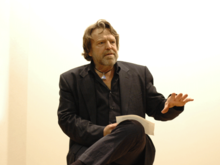网络独立宣言
《网路独立宣言》(英语:A Declaration of the Independence of Cyberspace)是发表在早期互联网上的一篇文章,主要讨论了政府在快速发展的互联网时代对互联网的管控问题。受开创性的互联网项目“网路空间24小时”的委托,这份宣言由电子前哨基金会的创始人约翰·佩里·巴洛撰写,并于1996年2月8日发表到网路上。[1]它主要是为了回应1996年在美国通过的1996年美国电信法。2014年,记录部录制并发布了巴洛阅读宣言的音讯和影片。[2][3]

内容
编辑| “ | 工业世界的政府们,你们这些令人生厌的铁血巨人们,我来自网络世界——一个崭新的心灵家园。作为未来的代言人,我代表未来,要求过去的你们别管我们。在我们这里,你们并不受欢迎。在我们聚集的地方,你们没有主权。 | ” |
| ——约翰·佩里·巴洛,《网络独立宣言》 | ||
此宣言强调,政府无法也不能统治互联网,政府对于网络空间没有主权。该宣言对互联网的外部力量如政府(特别是美国政府)进行了反驳。它指出,美国没有得到被监管者的同意,将法律适用于互联网,但互联网不属于任何的国家。相反,互联网正在制定自己的社会契约,以确定如何根据黄金法则处理其问题。该文件不仅提到了“电信法”,它还指责中国、德国、法国、俄罗斯、新加坡和意大利扼杀了互联网[4]。
背景
编辑在撰写宣言之前,巴洛已经多次就互联网及其社会与法律的现象撰写了许多文章[5],1994年3月在《连线》杂志上发表了他著名的作品《经济学思想》[6]。
评价
编辑巴洛的宣言迅速成名,并在互联网上广泛传播。在发表后的三个月内,约有5,000个网站转载了此宣言[7]。在发表后九个月,约有40,000个转载[8]。为了接近巴洛的自治互联网的愿景,由芝加哥肯特法学院主办的网络空间法研究所设立了一名虚拟法官。相关机构和其他法律团体将任命法官解决网上纠纷[7]。该声明因内部不一致而受到批评[9]。此宣言中称“‘网络空间’是一个从物理世界中移除的地方”的说法也受到了挑战,事实上互联网始终与其依赖的现实事物相关联[10]。
在互联网之外,对此宣言回应显得不那么积极。美国商务部助理部长拉里·欧文(Larry Irving)表示,缺乏保障措施将“减缓对消费者和企业产生重大利益的可能的增长”[7]。在杂志《热线》中,一位专栏作家称他的文章只是“胡言乱语(hogwash)”[11]。
在2002年,转载此宣言的网站数量大约已降至20,000个[12]。2004年,巴洛反思了他20世纪90年代所做出的工作,特别是他当时所持有的乐观主义态度。他说:“我们都变老了,变得更明智了”[13]。
随着互联网的发展,他的宣言受到了越来越多的人的质疑。在2016年,即网络空间独立宣言发表20周年的时候,巴洛仍坚持认为“网络空间是一种独立于物理世界的东西,与身心完全相同”(英语:Cyberspace is something that happens independently of the physical world in exactly the same way as the mind and body,)[14]。
参见
编辑参考资料
编辑- ^ John Perry Barlow: Is Cyberspace Still Anti-Sovereign?. 2018-02-12 [2019-01-27]. (原始内容存档于2018-02-10).
- ^ Department of Records. www.departmentofrecords.co. [2019-01-27]. (原始内容存档于2017-07-04).
- ^ Limited edition vinyl: John Perry Barlow reads "A Declaration of the Independence of Cyberspace" / Boing Boing. boingboing.net. [2019-01-27]. (原始内容存档于2015-02-24).
- ^ Barlow, John Perry. A Declaration of the Independence of Cyberspace. 1996-02-08 [2017-02-23]. (原始内容存档于2017-09-24).
- ^ Ley, Michael. DBLP: John Perry Barlow. [2007-02-09]. (原始内容存档于2007-02-25).
- ^ Barlow, John Perry. The Economy of Ideas. Wired. 1994-03-01 [2020-08-07]. ISSN 1059-1028. (原始内容存档于2021-05-01).
- ^ 7.0 7.1 7.2 Yang, Catherine. Law Creeps Onto the Lawless Net. BusinessWeek. 1996-05-06, (3474): 58–64 [2007-02-08]. (原始内容存档于2006-12-07).
- ^ Frezza, Bill. Can Public Network Computing Save Democracy. Network Computing. 1996-11-01: 35.
- ^ Evans, Woody. Cyberspace is the Child of the Industrial Age - Defining it as Independent is Nonsense. Institute for Ethics and Emerging Technologies. 2016 [2019-01-27]. (原始内容存档于2016-11-05).
- ^ Graham, Mark. Geography/internet: ethereal alternate dimensions of cyberspace or grounded augmented realities?. The Geographical Journal. 2013-03-01, 179 (2): 177–182. ISSN 0016-7398. doi:10.1111/geoj.12009 (英语).
- ^ Cembalest, Robin. The Featherman File. Forward. 1996-09-20, C: 2.
- ^ Barlow, John Perry. John Perry Barlow Declaration for Defendants in MGM et al. v. Grokster et al.. 2002-01-22 [2007-02-09]. (原始内容存档于10 February 2007).
- ^ Doherty, Brian. John Perry Barlow 2.0: The Thomas Jefferson of cyberspace reinvents his body — and his politics. Reason. August–September 2004 [2019-01-27]. (原始内容存档于2009-09-03).
- ^ Greenberg, Andy. It’s been 20 years since John Perry Barlow declared cyberspace independence. Wired. 2016-02-08 [2019-01-27]. ISSN 1059-1028. (原始内容存档于2018-10-02).